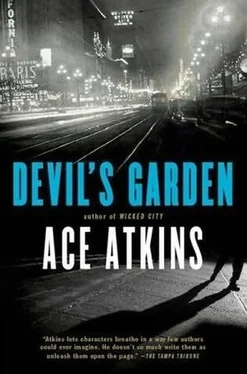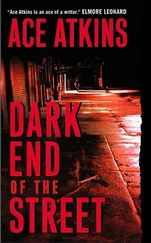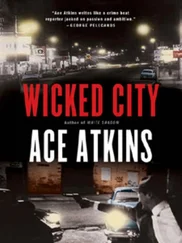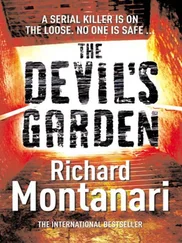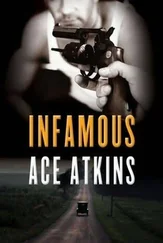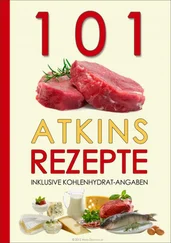Louderback rolled his fingers for U’Ren to move on and U’Ren smiled with his ragged little teeth and asked for the assistance of Miss Salome Doyle, who worked in Heinrich’s lab.
She was a skinny redheaded woman, flat ass, no tits, and a nervous little grin, aware of everyone watching her and loving it, as she set up an artist’s easel. Roscoe half expected her to curtsy. On the easel was an enlarged photograph with what looked like fingerprints made of silver. Roscoe leaned in, nicked a rough cuticle off with his mouth, looked down at his hands and then back at the easel.
This skinny fella Heinrich was led by the nose through the setup: Three doors from the St. Francis. Two handprints on a panel. One belonged to Virginia, with an overlay of prints belonging to Roscoe.
Roscoe looked over to McNab, but McNab showed nothing. His hands crossed over his big chest, breathing, resting like an old fighter in the corner. Roscoe thought McNab might doze off in the heated courtroom.
“And what does this pattern say? How does it speak to you, Professor?”
“It says that at some point Mr. Arbuckle had his hands over Miss Rappe’s by the door.”
“In what manner?”
“It’s of a scientific opinion that there was a struggle,” Heinrich said.
“Objection,” McNab said, on his feet. “The witness is an expert in identifying fingerprints. No body of work exists that allows Professor Heinrich or Salome Doyle to read them like tea leaves.”
“What did scientific methods show?” U’Ren said, glad of the correction, smiling and pacing. Mouth closed, waiting for Heinrich to spill what he’d been coached to say.
“My methods conclude me to believe that Mr. Arbuckle was trying to prevent Miss Rappe from leaving the room. You can plainly see the patterns formed in the aluminum dust.”
“Objection,” McNab said.
“Sustained,” Judge Louderback said. “The jury will disregard the witness’s testimony as to the events precipitating the fingerprints.”
Several jurists scribbled into notebooks. Roscoe looked at them and then back at his hands. Big paddle fans wheeled above them all. Stray coughs and seat shuffles while U’Ren drove home his points.
When he finished, McNab took his place, pulling his watch out on its gold chain to check the time and buttoning back his black coat.
“Is it possible to have these doors reexamined?” McNab asked.
“No.”
“Because too many hands have touched them.”
“In the courtroom.”
“Perhaps even wiped down with a cloth.”
“Perhaps.”
“Calling up your methods and as an expert in such matters, could these surfaces show sufficient prints after being wiped down and scrubbed with a cloth?”
“I would say not.”
“Prints would be obliterated.”
“Yes.”
McNab nodded, thoroughly interested, digesting what Heinrich had to say, slowly looking over to skinny Salome Doyle and nodding at her.
“On what days were these doors removed from the St. Francis and taken to your laboratory in Berkeley?” he asked.
“I don’t recall.”
“Did you not make notes?”
“I most certainly did,” Heinrich said, opening a thick but small ledger.
“September sixteenth. It was Friday.”
McNab smiled.
“Eleven days after Miss Rappe took ill?”
“The room had been sealed.”
Brady was on his feet and the judge motioned him over and there was much squabbling, words that Roscoe couldn’t hear. And then Brady walked back to the prosecutor’s table and sat back down.
“Was the room encased in glass?”
“The doors were locked.”
“And not a single person touched these doors since Miss Rappe was moved into 1227.”
“Yes.”
“A record of the events frozen in time.”
“Most surely.”
“And you’re sure even the most gentle wiping of a dustcloth would remove such evidence?”
“The tests could only be conducted in my laboratory with Miss Doyle’s help.”
“Not to be repeated now.”
“Yes.”
“Because the doors are tainted.”
Brady stood and frowned. “Judge?”
Judge Louderback looked down at McNab. “Cover new ground.”
“Your Honor,” McNab said, “to ease the confusion of the court and the jury, I wish to call a rebuttal witness at this time.”
Louderback waited.
“A Miss Katherine Brennan.”
Louderback looked annoyed and bored. Roscoe poured some more water.
“And who is that?” the judge asked.
“The good woman who cleaned that room the day after the Arbuckle party. Since we’re calling her work into question, it’s only right that she has the opportunity to respond.”
THE STRONG ROOM on the Sonoma was a solid steel box, sealed with a solid steel door that took three keys to open. The keys belonged to the first officer, the purser, and the captain. According to the rules, all three had to be present when the door was opened and when it was closed and locked. The captain told Sam he’d made regular trips, night and day, to test the door’s integrity. But he did not open the door nor could he see inside. The strong room had no windows, no barred peepholes, and, as far as the captain knew, the loot had been stolen shortly after he’d seen the safes loaded inside at Honolulu. Fifteen chests, each one containing ten thousand gold sovereigns.
“Mr. Houdini couldn’t find his way out.”
“How much do they weigh?” Sam asked, examining the three locks.
“The chests?”
“Eighty pounds.”
“And five are missing?”
The first officer nodded. The purser joined them and then Captain Trask.
Each man showed Sam the lock procedure. Repeating it twice more. “Fifty thousand gold sovereigns. Four hundred pounds,” Sam said.
“Could they have been off-loaded with the booze?”
“What booze?” Captain Trask asked, mustache twitching.
“The booze crates you dropped at the three-mile limit.”
The captain’s eyes were very clear and very blue, and he soon blinked and simply said, “No. I watch that shipment myself.”
Trask pushed open the steel door and it groaned and clanged against the inside wall. The men waited for him outside as if their presence would taint his work. The strong room was oval and painted with a pink primer to stop the rust. Sheets of metal formed the curved corners, rivets driven in flush with each piece. Sam felt over the smoothness of the room, the gentle curves, and below him he could hear the humming and pulsing of the engine room, a woosh, woosh sound that was comforting.
The ten remaining chests lay in an orderly row, side by side. Everything else had been removed from the hold. Sam dropped to his knees and touched the blackened scars on the pink primer where chests had been dragged from the room. The black marks went straight for the steel door, and there were no signs that any other point of entry was possible, no ventilation ducts, no signs of drilling. Sam felt the tracks, gouging deep into the paint, where the gold was ripped from the room. He moved his hands along the path, feeling something wet and, smelling his fingers, knowing it was some really good Scotch.
The Scotch formed a very small puddle in a low spot in the steel sheeting. At some point, maybe this voyage or maybe one from years ago, a single rivet had been yanked away in the path. Most of the Scotch had drained out through the tiny hole and Sam wondered if there wasn’t a lucky crewman below who thought his prayers had been answered.
He stood in the room for a long time, hearing that gentle woosh, and cursing himself for not seeing the obvious.
“Sir?” asked the first officer.
Sam turned.
“We need to lock back up,” he said.
Sam nodded and stepped through the bulkhead. The door sealed and locked by all three men.
Читать дальше
